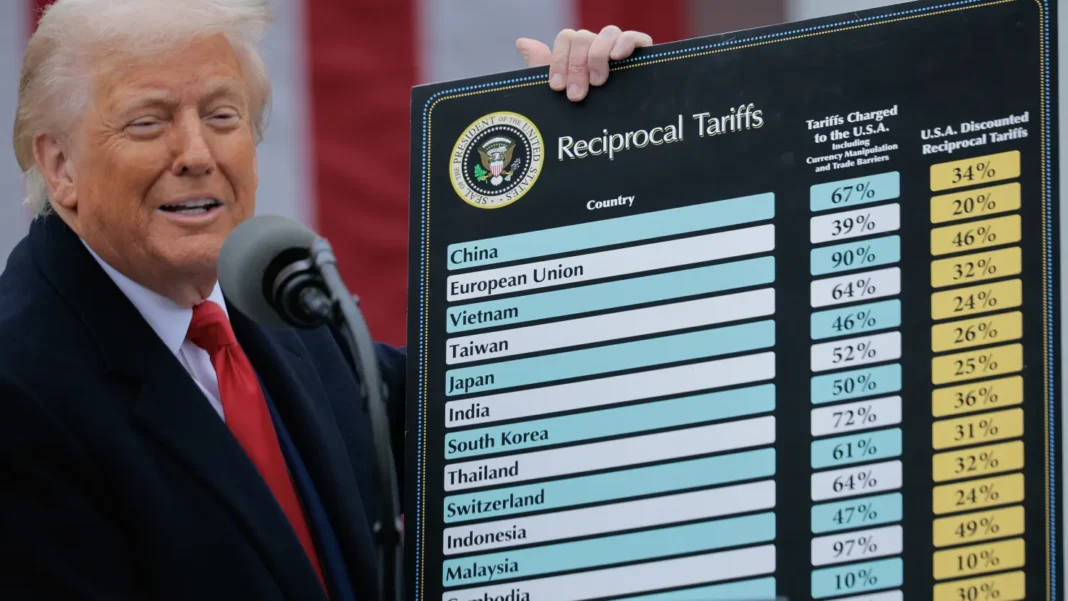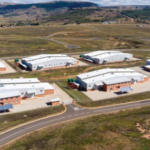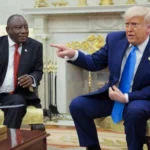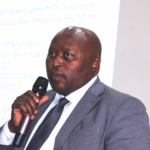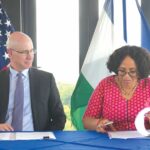United States President Donald Trump’s unexpected decision to suspend tariffs on a range of imports has reverberated across the global economic landscape, stirring debate about its implications for both major players and smaller nations alike.
For Lesotho, this move represents more than just a footnote in U.S. trade policy, it’s a potential lifeline. While the suspension is ostensibly designed to recalibrate America’s economic priorities, its ripple effects offer Lesotho a rare chance to pause, breathe, and rethink its approach to an increasingly volatile world stage.
Lesotho’s economy, heavily dependent on textile exports under frameworks like the African Growth and Opportunity Act (AGOA), has long been at the mercy of external forces. Tariffs, or the threat of them, loom large over its planning, often forcing hasty decisions to safeguard its fragile market access.
Trump’s tariff rollback, even if temporary, lifts some of that pressure, granting Maseru a moment of reprieve. This isn’t a permanent fix, nor does it erase the structural challenges Lesotho faces, but it does provide a window to shift away from reactive, short-term fixes toward a more thoughtful, sustainable strategy.
That window is critical, because Lesotho’s recent instincts have leaned toward knee-jerk responses that risk more harm than good. Consider the murmurings of sending a high-level diplomatic mission to Washington to lobby for favour, an expensive and uncertain gamble that could easily backfire by signaling desperation rather than strength.
Or take the more troubling proposal to fast-track a license for Starlink, Elon Musk’s satellite internet venture, as a means of aligning with American interests. On the surface, it might seem like a clever geopolitical play, but dig deeper, and it’s a move fraught with peril.
Such a decision could undermine the independence of the Lesotho Communications Authority (LCA), the body tasked with regulating the nation’s telecom sector, and erode Lesotho’s sovereignty over its digital future. With tariffs off the table for now, the urgency behind these measures dissipates, giving Lesotho the space to reconsider whether they are worth pursuing at all.
This isn’t to suggest complacency. The tariff suspension is a pause, not a pardon. Lesotho’s leaders must recognise it as an opportunity to address deeper issues that have long constrained the nation’s growth. The textile industry, while a vital economic artery, remains vulnerable to global competition and shifting trade policies.
Diversifying export markets, perhaps deepening ties with emerging economies in Asia or strengthening intra-African trade under the African Continental Free Trade Area (AfCFTA), could reduce Lesotho’s reliance on any single partner, including the United States. At home, investments in infrastructure, education, and technology could bolster pliability, making the country less susceptible to the whims of distant policymakers.
The Starlink question, too, deserves a more measured debate. Satellite internet could indeed transform connectivity in Lesotho’s mountainous terrain, where traditional infrastructure struggles to reach remote communities.
But any decision should stem from national need, not external pressure. The LCA’s role is to weigh such proposals on their merits, technical feasibility, cost, and public benefit, not to serve as a bargaining chip in international negotiations. Trump’s tariff move buys time for that process to unfold organically, free from the specter of economic retaliation.
In a broader sense, this moment underscores a truth Lesotho cannot afford to ignore: its fortunes are tied to a global system it can influence only marginally. The tariff suspension is a reminder of how abruptly that system can shift, and how little control Maseru has over the levers in Washington, Brussels, or Beijing.
The task, then, is to use this breathing room to build a buffer against the next inevitable shock, whether it’s a tariff hike, a trade dispute, or a geopolitical realignment.
Trump’s decision, whatever its motives, has handed Lesotho a chance to break from the cycle of reactionary policymaking. It’s an invitation to think bigger, to prioritise sovereignty over expediency, strategy over survival.
Whether Lesotho’s leaders seize this opportunity or squander it on the same old playbook will determine not just how they weather the next few months, but how they position the nation for the years ahead. For now, the tariffs are on hold. The question is: what will Lesotho do with the time it’s been given?
Summary
- While the suspension is ostensibly designed to recalibrate America’s economic priorities, its ripple effects offer Lesotho a rare chance to pause, breathe, and rethink its approach to an increasingly volatile world stage.
- This isn’t a permanent fix, nor does it erase the structural challenges Lesotho faces, but it does provide a window to shift away from reactive, short-term fixes toward a more thoughtful, sustainable strategy.
- The task, then, is to use this breathing room to build a buffer against the next inevitable shock, whether it’s a tariff hike, a trade dispute, or a geopolitical realignment.

Authored by our expert team of writers and editors, with thorough research.


